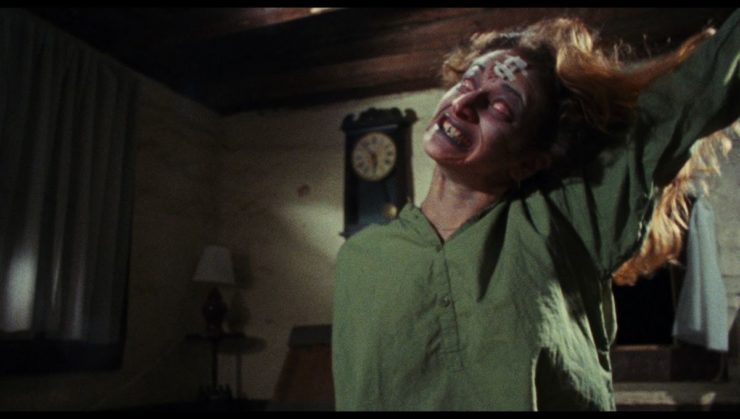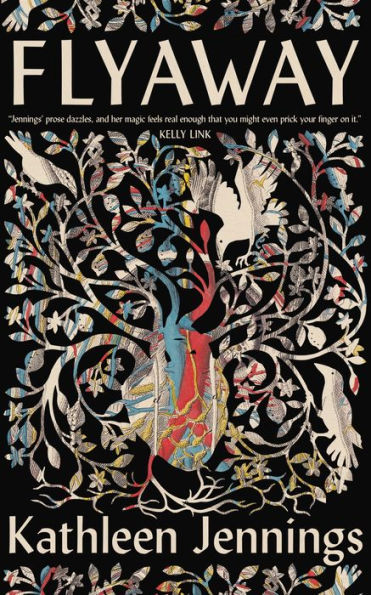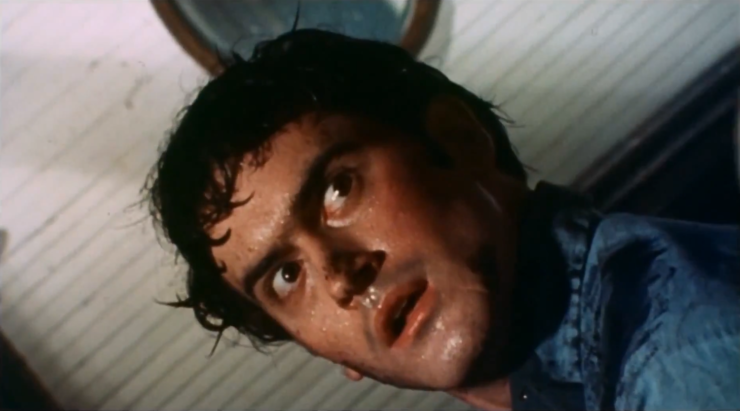The Blair Witch Project is generally credited with inventing the found footage horror genre in 1999. But if you are looking for the first film with shaky camera work and amateurish actors stumbling around in the woods, you need to go back 18 years earlier to Sam Raimi’s The Evil Dead, a movie whose scrappy anti-slickness was, unexpectedly, both inimitable and one of the most prescient looks of the ’80s.
The Evil Dead was made for only about $350,000, and it looks like it. But where found footage movies use their low-budget aesthetic to signal authenticity and ground-level hand-held documentary verité, Raimi leans into the wrongness of his ersatz grungy fakeness. The giddy terror of Evil Dead comes from the way it plunges its hapless protagonists into a pasteboard world, in which literally anything can come tearing through the cabin walls. “It’s not real” can be a comforting mantra—until, suddenly, it isn’t.
The uncanny-valley wrongness of the movie starts even before the dead begin to rise, with the awkward, zombie-ish acting of the protagonists. The four kids driving out to the remote cabin in the woods for a vacation are all played with corny awkwardness by actors who make the B-movie clunkiness of Friday the 13th’s cast look like Shakespearean poise. Bruce Campbell as Ash has a certain intensity already at this early stage in his career, but he’s still far from convincing when he reassures everyone about the cabin. “It could be nice!” His girlfriend Linda (Betsy Baker) is even more mannequin-like when she responds with a vacant piping, “Yeah!”
That vacant piping is laughable at first. But it takes on more sinister overtones when it’s coming from a demon with lots of ghastly make-up and blank white eyes. Once in the cabin, the teens find an evil book and then play a tape in which a professor (played by smooth-voiced Bob Dorian) utters a demonic incantation. Soon the young people are being transformed into laughing, shrieking, zombie demon deadites.

Those transformations are weirdly disturbing in no small part because the demonic-possessed characters, spewing fluid and blood and venom, are in many ways more believable than their unpossessed selves. When Linda as demon sits on the floor cackling like a broken doll, it comes across as an over-the-top, biting, parody of empty-headed yes-girl girlfriend Linda. Ash’s ineffectively brooding sister Cheryl (Ellen Sandweiss) finds her true calling as a screaming fiendish thing in the basement, rattling the chains across the cellar door and bellowing “Join us! Join us!” Those clunky teens are just sad meat sheathes, from which the evil dead come bursting with vivid, spurting glee.
If the characters are hollow mannequins waiting to be filled with horror, the same goes double for the monster. In fact, there is no real monster; the thing in the woods is never visualized. Instead, it is literally the camera, or the director. Films like John Carpenter’s Halloween had established the shaky-cam, killer’s-eye view, where the filmgoer is made to see from the slasher’s perspective, so that the frame comes alive with malevolent purpose and creeping dread.
In Evil Dead, Raimi went a step further. His monster is nothing but the shaky cam. You never see the thing rushing through the trees that make the kids run. It doesn’t even seem to have a body, though its voice mutters and grunts, and trees fall around it as it comes for them. It’s like the kids are being hunted by the director himself. When he catches them, he will crush their stilted performances from them, and fill them with terrible purpose—most literally, and squickily, when Cheryl is caught in the forest by vines come to life, which tie her down and plunge into her in an ugly sexual violation. Like Cabin in the Woods, which Evil Dead certainly inspired, the film and the cabin are one, and both are a deliberate trap. The cabin, the landscape, the plot—it’s all rigged by Satan and/or Raimi to close around the hapless teens and strangle them to death.
Buy the Book


Flyaway
It’s not just in the woods that the camera stalks the kids. The movie’s most virtuoso sequence occurs near the end of the film, when Ash’s three friends are dead, and he’s alone in the cabin with a shotgun. The camera looks up at him through the floorboards, then switches around to look down at him from the ceiling, then flips over and stares at him upside down, or peers out at him from inside the clock, watching him through the swaying pendulum. Even more blatantly, while Ash is stumbling through the basement in search of more shells, the evil spirit activates a film projector, and Ash is caught in its light against a wall, with blood streaming down around him. The antagonist is not just a nameless horror from beyond the grave. The antagonist is horror film itself.
The final special effects extravaganza, when Ash burns the evil book and the deadites come apart, is flamboyantly unconvincing in comparison to state-of-the-art digital technology—or even compared to the quieter, low-fi visuals of found footage films like The Blair Witch Project or Paranormal Activity. Raimi uses stop-motion to have his zombies age and crack apart and dissolve in a geyser of fluid and tactile ooze. Arms burst from their torsos and tear them apart, and buckets of blood are tossed about the room and into Ash’s face. The sequence is so gratuitous, and so extended, it’s hard not to laugh. But it’s also genuinely disturbing because it has the not-quite-real consistency of nightmare. The artificiality and wrongness is part of the horror.
It’s also part of the joy. Evil Dead is a movie in love with its own construction. Raimi relishes his own DIY scrappiness—the way he can make you shudder just by panning around a house or zooming in on a clockface. The director makes movie-making look like so much fun, it’s no wonder that he inspired so many remakes, homages, and imitators. But no matter how many directors return to that forest, it’s unlikely anyone will ever reproduce Evil Dead’s weaponized feral clunkiness. Even Raimi himself, for all his talent, never raised that spirit again.
Noah Berlatsky is the author of Wonder Woman: Bondage and Feminism in the Marston/Peter Comics (Rutgers University Press).










